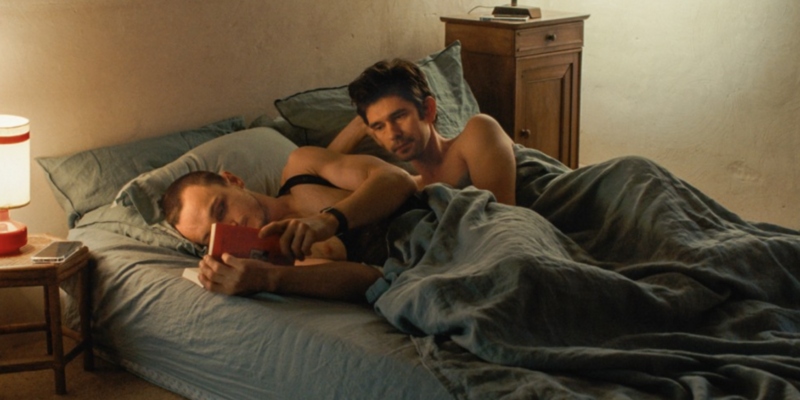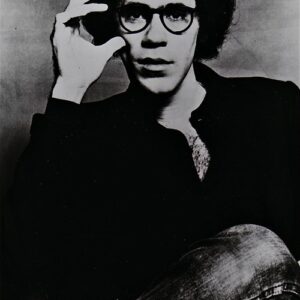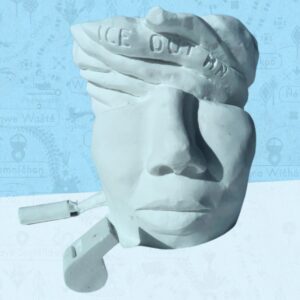
Liberatory Art: What Passages Achieves in the History of Cinema and Desire
”Passages can mean so much without us strip-mining its parts for parts.”
The dolly moves the camera away from or towards. These directions take on emotional resonances, depending on the object of the camera’s scrutiny, depending on how it wants them. “Dolly out” becomes motion away—I don’t want. “Dolly in” becomes interest in—I want. This is the way a cinema moves. Emotions emerge in cinematic language because emotions are attached to humans, who operate cameras. All camera moves negotiate desire because cinema is the medium of watching.
The motion of the camera through space, the dolly shot, introduces the sensation of another body: we experience the physical space the camera has traveled through, being pushed or being pulled, which our senses tell us is the same physical space as the subject. Desire needs distance to move through, otherwise it’s theoretical, academic. Without the rush towards touch and the flight when it starts to press too hard, there cannot be a cinema.
Passages, the eighth feature film directed by Ira Sachs (now streaming on MUBI), arrives at a tempting moment in cinema—and desire’s—history. It has been shouldered with reacquainting audiences with sex scenes amid the mostly online malaise regarding on-screen erotics while contending with the very real continued proliferation of anti-gay sentiment and actions, not in the moviehouse but at the ballot box and houses of governance. It must both address the collective cinephile’s anxieties over the disappearing “mid-budget film about love and lust”—consider two of Sachs’ beloved antecedents, Pialat and Eustache—while also existing as a mid-budget film about love and lust in a filmic ecosystem redoubtably dominated by zombified IP and over-warmed, undercooked corporate tupperwares.
And it must make money, the drudge designation of all art under capitalism. To do that, it must scratch out getting seen, even as it combats—in an unwelcome boomerang back to cinema’s perpetual struggle with American puritanism and puritan Americanism—the Motion Picture Association, which assigned the film an NC-17 rating, all but proclaiming the film’s frank sex scenes, especially between its two male leads, worth shielding viewers’ eyes from. “It’s really about a form of cultural censorship that is quite dangerous,” Sachs told the Los Angeles Times, speaking about the MPA’s decision. “Particularly in a culture which is already battling, in such extreme ways, the possibility of LGBT imagery to exist.”
Passages, then, arrives in a moment when to dolly out on Passages is to hold it responsible for remedying so many of the cracks and crevasses in our collective effort to make and access art in 2023. It is not enough to desire, to be desired, to see desire and want to show it, we implore the art film. It must overcome our everything. It must consume us if we are to consume it.
How lucky, then, to have the film piloted by Ira Sachs, one of the great buoyancies in anti-consumer artmaking in the last three decades. Principally, this buoyancy comes not from optimism—a feeling too susceptible to marketing and en-corporation to retain an essential edge—but desire itself. Sachs’ desires to see more of the world, to show it and see it. This feels good. Desire feels good, as does being desired. It feels bad too, which is part of the desired arrangement. The regular interplay of desire got and desire frustrated, in home and in body—this is the see-saw stuff of Love is Strange (2014) and Keep the Lights On (2012), of the way want curdles and flourishes in the family collective, as in Little Men (2016), and liberty to be or spend time or money, as in Frankie (2019). The play of desire becomes a motion of objects moving towards and then repelling, returning only to spin out. It’s a regular facet of being alive, not a grand weapon in a discourse crusade or a creative writing exercise. Desire is the fact of desire, which is so much more than enough.
The fucking is good. The dancing is good. The jokes are good. The hard conversations are good. These things aren’t other, deeper things.
Passages speaks the lingua franca of many of these films: a trust—indeed, a desire—for the actors to tell the story as the movie encounters them around themselves. It begins on the movie set twice over, as the camera eye pans around a set for a film called Passages. “Action” is called and extras file down the staircase. One boy in particular, a little loping in his step and jangly in his arms, draws the attention of Tomas (Franz Rogowski), who stops the shot. Tomas gives the boy a few notes, tells him to not swing his arms so much. They start the shot over, Tomas stops it again, gives the boy more notes, then nitpicks a few of the other extras. He is trying to get them to move in a way that suggests that their coming down the stairs is not about them coming down the stairs. It’s just them moving from one space to another. From off to on, through the stairs to a bar, into a space they’re looking forward to being in. We never see the actors get the shot right. Presumably they do: Passages (Sachs’ film, not Tomas’) jumps ahead not long after, to the wrap party at a bar. The actors, in both films, have transitioned into the place they want to be.
The film unfolds. It uncurls, rather, flexes and then scrunches. Tomas’ attentions and appetites are variously drawn to his husband of many years, Martin (Ben Whishaw) and Agathe (Adèle Exarchopoulos), a teacher he encounters at the wrap party, first as a dance partner and later in bed. When Tomas confesses this act the next morning, excitedly, Martin is wounded, then expresses understanding. He reminds Tomas “you always get like this” at the end of shooting. He tries to remind himself of this fact as well.
Tomas and Agathe’s tryst spikes into a full-blown affair. Martin and Tomas separate, sort of. Martin begins an affair with Ahmad (Erwan Kepoa Falé), and Tomas continues—scene to scene—chasing and appeasing, ignoring and consuming his two scene partners. He is out of control and chasing control, exerting it over two people who desire him, who he desires. Agathe becomes pregnant. Tomas proposes that the three can make the arrangement work, raise the child, sustain the tête-à-tête-à-tête. They can’t, really, clearly: Tomas doesn’t want three equal parts, but two parts that he can have. Martin doesn’t know how wanting that feels, but he wants a child. Agathe doesn’t want this kind of desire—hot and cold, not on her terms—at all.
It’s tempting to make too much and too little of the first experience of Tomas, as a director of actors, in light of the film’s unfolding. In one light, his fixated direction of his actors reads as controlling and fussy, an exercise in power simply to show that it exists. And surely, Tomas’ entry into the film feels domineering and preening, the opposite of his body language at the close as he kneels dejected in a school hallway or pedals a too-small bike around the streets of Paris, the camera dollying beside him, in and out. He is behaving differently, as the discordant underscore insists. “Scoring” itself is a tactic used sparingly if at all throughout—the film prefers the songs the characters listen to. And so, the entry of discordant saxophone at the close is especially chaotic to Tomas’ interiority in these penultimate moments. Has Tomas changed? Surely, a character is a person, especially in an Ira Sachs film; the behavior of people is not incidental, nor is our reaction to it. And Rogowski offers a performance too subtle to be misread as “unlikeable” or “static.” Tomas’ eyes scrutinize and dare in the early goings and soften to a kind of frustrated and then bewildered blink by the end. He is seeing the world differently. Desire does this.
On the other hand, we might beware imposing the dramatic fallout of Passages on the actions of its protagonist’s past. We might resist the urge to psychologize—or worse, pathologize—him and treat his actions as evidence of some future sin. We might resist thinking of images in terms of evidence at all. Mostly, Tomas looks like a director in the opening scenes. I suspect he is probably a good one.
Passages isn’t about a character changing. There isn’t a message so much as a loss, and then a change in lens. But Sachs and his collaborators respect the audience too much, have too much love for growth and transformation, to offer something as reducible or consumable as a sketch, even a sexy one. While Passages isn’t about a character learning a message—that the audience is, in turn, supposed to learn—this framing is, from a certain angle, the message of Passages: art and life aren’t resources for extraction. Tomas at the beginning of the film doesn’t exist as a foil to be mined for Tomas and us at the end.
This framing is, from a certain angle, the message of Passages: art and life aren’t resources for extraction.
Passages can mean so much without us strip-mining its parts for parts. Frequently funny and escalatingly absurd, this is a film that is about, if it’s about anything, the plastic power of outfits—the moments of levity and irony don’t annotate our history or psychiatry, don’t disprove our despair or ask us to entertain escapism. They emerge, pleasurably, as life sometimes does. That they are occasionally more spectacular than realistic is the bastion of art—isn’t part of the point of the effort to look at pleasing things?
At a crisp 90 minutes and editing to shuttle us into and out of the drama, Passages can remind us of the morphable power of narrative without speaking in the staid voice of the instructor. Its best moments—as in the blanks between Proust’s slates or the un-inked space around Whitman’s—are its elisions, as it cuts then jumps before a scene “finishes,” into one that’s already “begun.” Sometimes the collisions begin on-screen. Tomas’ re-seduction of Martin when the former spends an at-first unwelcome night at the apartment is as thoughtfully choreographed and tempoed as any erotic scene that’s played in a moviehouse in years. The fucking is good. It doesn’t have to be exemplary of anything other than good fucking. Sometimes the encounters begin before we get a glimpse, as when we’re dropped into an early bedside argument between Tomas and Martin, the former’s body wound around and pointing away from the camera and nearly obscuring Martin’s thin frame from view. The shot continues, their argument already mid wheel-spinning and going nowhere, remaining there.
What we don’t get is as satisfying as what we do. Sachs refuses to patronize the spectator; he respects us and his actors too much. We never watch Agathe and Tomas deliberate the decision to get an abortion. Instead, we watch Tomas drive her to the train, watch her disaffected discomfort and his puerile frustration. And then we cut to Exarchopoulos curled in bed, looking lost, looking. She looks like she did in bed a few nights and a few shots earlier, listening to Tomas and Martin fuck noisily, realizing that she doesn’t want this, whatever it may be. Passages makes as good a case as any film this year (or any other) to consider actors fellow image-makers equal with their directors and cinematographers and editors. In no small part, it’s due to their collective willingness to perform the truth of their characters’ messes, the myriad ways that want spills over and sometimes settles for getting-off instead of resolution. As performers, they don’t cannibalize intention for meaning. The fucking is good. The dancing is good. The jokes are good. The hard conversations are good. These things aren’t other, deeper things.
If the unsurprising (and unfortunate) trouble Passages has encountered at the hands of several filmic institutions ping Hollywood’s Code days in our collective consciousness, it is appropriate and thrilling that Sachs and his collaborators have crafted a work that chimes in the liberatory buzz of pre-Code art. A tempting reduction to apply to such objects approaches them in terms of their possibility: how did they possibly make something so free? Watching William Dieterle’s Kay Francis/William Powell vehicle Jewel Robbery (1932) elicits such a reaction, so hungry are the actors’ gazes and so easily does the script and direction conjure a world where cops might be perpetually clueless and wrong, where the heroic act is always to drug policing forces with marijuana cigarettes while stealing back glamor and leisure. How did they make something so free?
They made it—like Passages—by simply looking around the world. Liberatory art and life is the baseline for existence, not the exception, no matter what our art and “real” life tell us. Looking closer, moving into it, we realize we make it by wanting it, which has always been more than enough.
Frank Falisi
Frank Falisi is an Associate Editor at Bright Wall/ Dark Room. His writing has appeared in Reverse Shot, Mubi Notebook, the LA Review of Books, and other outlets. He is currently a student at CUNY’s Graduate Center.



















